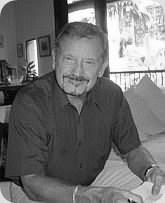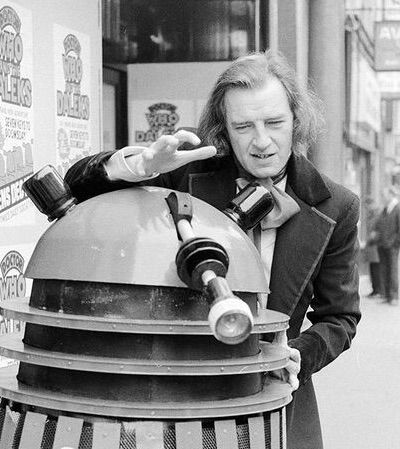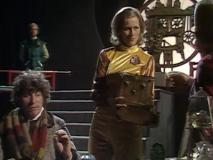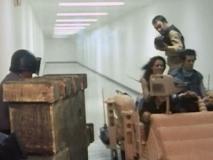
Actor and writer and inventor of the Sonic Screwdriver
Victor Pemberton has died at the age of 85
Victor Pemberton was one of a select group of people to have both written for and appeared in Doctor Who.
In 1967, while trying to get writing work, he was earning money playing bit parts including that of a scientist in the Second Doctor story
The Moonbase. But his real love was writing and when his friend
Peter Bryant took over as the series Story Editor he was brought in as Bryant's assistant. He script-edited
The Tomb of the Cybermen for Bryant, writing the poignant scene between the Doctor and Victoria where the Doctor explains how their lives are different.
Pemberton returned to freelance writing to pen
Fury from the Deep, which saw the departure of the character Victoria from the series. It also saw the introduction of an iconic object that would forever be associated with the Doctor, The Sonic Screwdriver.
Fury from the Deep was Pemberton's only contribution to the TV series, but one of which he was very proud.
The cost of mounting Fury was astonishing, for budgets for filming in those days was miniscule, and when you think that a helicopter had to be used, and fake foam sprayed onto the sea, no wonder I got a few glares from the production crew! However, the late Hugh David did tell me that the scale of it was a challenge that he greatly enjoyed, and, as far as I’m concerned, he met that challenge superbly. But the great joy of getting Fury onto the screen was working with dear old Pat Troughton, who was already a friend, together with Debbie Watling, who had the best scream in the business, and Fraser Hines, who was the best practical joker!
In 1976 Pemberton wrote the audio adventure
Doctor Who and the Pescatons, initially released as an LP and cassette and starring
Tom Baker and
Elisabeth Sladen. He wrote the Target novelisations of both Fury from the Deep and The Pescatons.
Victor Pemberton was born in London in 1931. His first job was as a mail delivery boy for a timber magazine in Fleet Street, followed by a short spell in the publicity and printing department of
20th Century Fox. Two years National service in the Royal Air Force followed, where he set up an entertainment system for the troops. His father brought him his first typewriter after he expressed a desire to be a writer.
His first drama scripts were for BBC Radio. In 1961 he wrote
The Gold Watch, a play based on the extraordinary circumstances of his father’s retirement. Many other scripts followed, including
The Slide, a seven episode science-fiction serial about an earthquake in the south of England, which starred
Roger Delgardo and
Maurice Denham. TV followed in 1965 with a script for a children's series on ITV called
Send Foster. After Doctor Who he contributed to series such as
Timeslip, Ace of Wands, The Adventures of Black Beauty and
Within These Walls. In 1993 he invented the character of the Lighthouse Keeper for the UP version of the
Jim Henson series
Fraggle RockIn 1987 he formed Saffron Productions Ltd making a number of documentary films, including
Gwen, A Juliet Remembered and
Benny Hill: Clown Imperial for the BBC. In 1990, Headline Book Publications asked him to write a novelisation of his BBC Drama radio series,
Our Family. He went onto write fifteen novels.
In 2016 he undertook his Arctic Adventure, traveling alone by car through seven countries of Europe and Scandinavia to reach the Norwegian town of Bodo – in the Arctic Circle, in order to raise money for the charity
Help for Heros.
Victor Pemberton's lifetime partner was the actor
David Spenser, who died in 2013.
Victor Pemberton Website 
 The writer David Fisher has died at the age of 88.
The writer David Fisher has died at the age of 88.  The actor
The actor  The actor
The actor  One of the most prolific contributors to Doctor Who, Composer
One of the most prolific contributors to Doctor Who, Composer 


 Actor and writer and inventor of the Sonic Screwdriver
Actor and writer and inventor of the Sonic Screwdriver 


















